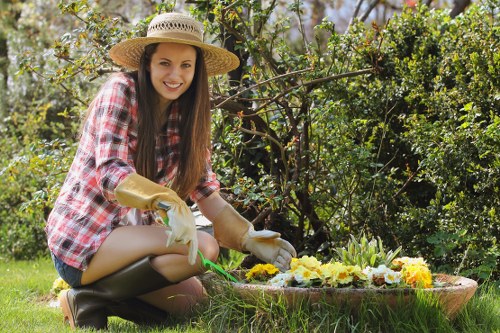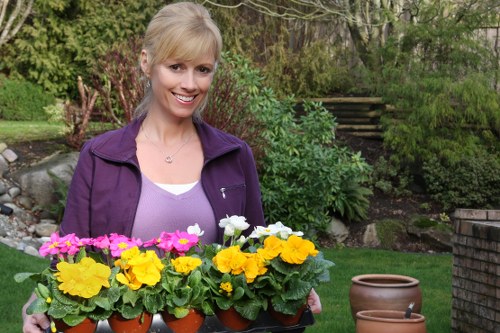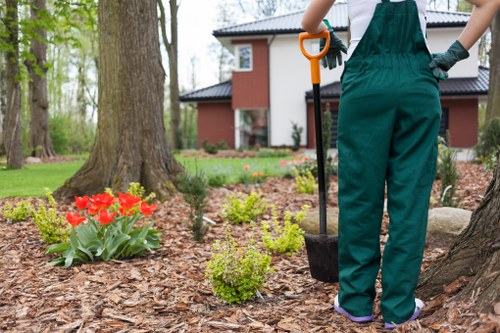Comprehensive Guide to Garden Maintenance in Chingford
Maintaining a beautiful garden in Chingford requires dedication, knowledge, and the right tools. Whether you are a seasoned gardener or just starting, understanding the unique aspects of garden maintenance in this area can help you create a thriving outdoor space.
Chingford, located in the London Borough of Waltham Forest, offers a variety of climates and soil types that can affect how your garden grows. From lush flower beds to well-manicured lawns, proper maintenance ensures your garden remains a sanctuary.
One of the first steps in effective garden maintenance is understanding the local climate. Chingford experiences temperate weather with distinct seasons, each requiring different care techniques for your plants.
Seasonal Garden Care
Garden maintenance in Chingford varies throughout the year. Spring is a time for planting and preparing your garden beds. Early spring requires attention to soil preparation, including aeration and the addition of compost to enrich the soil.
Summer garden care focuses on watering, weeding, and protecting plants from pests. Regular watering, especially during dry spells, is crucial to keep your garden vibrant.
Autumn involves preparing your garden for the colder months by pruning trees and shrubs, and removing dead foliage. This helps prevent diseases and encourages healthy growth in the spring.
Winter Maintenance Tips

Winter can be challenging for garden maintenance. In Chingford, protecting your plants from frost and freezing temperatures is essential. Mulching around plants helps insulate the soil and retain moisture.
It's also a good time to plan for the next gardening season. Reviewing what worked and what didn't can help you make informed decisions for your garden's future.
Additionally, maintaining garden tools during the winter ensures they are in good condition when gardening resumes. Cleaning and storing tools properly extends their lifespan.
Essential Garden Tools

Having the right tools is fundamental to effective garden maintenance. For Chingford gardeners, essential tools include:
- Pruners: For trimming and shaping plants.
- Garden Hose: Ensures proper watering of plants.
- Spade: Useful for digging and soil turning.
- Rake: Helps in collecting leaves and debris.
- Gloves: Protects your hands while gardening.
Investing in high-quality tools can make garden maintenance tasks easier and more efficient. Regular maintenance of these tools, such as sharpening blades and cleaning, will enhance their performance.
Choosing the Right Plants

Selecting plants that thrive in Chingford's climate is crucial for a successful garden. Consider native plants that are adapted to the local conditions, requiring less water and maintenance.
Perennials, annuals, and shrubs each have their own maintenance needs. Understanding these can help you create a balanced and sustainable garden.
- Perennials: Come back year after year with minimal care.
- Annuals: Provide vibrant color but need replanting each season.
- Shrubs: Offer structure and evergreen options for year-round interest.
Soil Health and Fertilization
Healthy soil is the foundation of a thriving garden. In Chingford, testing your soil can help determine its pH levels and nutrient content, allowing you to amend it appropriately.
Fertilizing your garden ensures that plants receive essential nutrients. Organic fertilizers are a sustainable option that improve soil structure and support beneficial microorganisms.
Mulching not only conserves moisture but also enhances soil fertility as it decomposes. Regularly adding mulch can reduce weed growth and maintain consistent soil temperatures.
Watering Techniques
Proper watering is vital for garden health. Overwatering can lead to root rot, while underwatering stresses plants. In Chingford, morning watering is recommended to allow foliage to dry before nightfall, minimizing disease risks.
Drip irrigation systems are efficient in delivering water directly to the roots, reducing evaporation and conserving water. Implementing such systems can save time and resources.
Monitoring soil moisture levels helps in adjusting watering schedules according to weather conditions, ensuring your plants receive the right amount of water.
Pest and Disease Management
Garden pests and diseases can undermine your maintenance efforts. In Chingford, common pests include aphids, slugs, and beetles. Implementing integrated pest management (IPM) strategies can effectively control these issues.
Regularly inspecting plants for signs of pests or diseases allows for early intervention. Natural remedies and beneficial insects are environmentally friendly options for managing infestations.
Maintaining plant health through proper care makes them more resilient against pests and diseases, reducing the need for chemical treatments.
Pruning and Trimming
Pruning is essential for the health and appearance of your garden plants. It encourages growth, removes dead or diseased branches, and shapes plants to their desired form.
Different plants require different pruning techniques. Understanding the specific needs of each plant type in your garden ensures effective and safe trimming.
Regular pruning also improves air circulation and sunlight penetration, which are crucial for plant vitality.
Garden Design and Layout
Thoughtful garden design enhances both functionality and aesthetics. In Chingford, consider the layout that complements your home's architecture and the natural landscape.
Incorporating elements like pathways, seating areas, and water features can create a harmonious and inviting outdoor space.
Choosing a variety of plants with different heights, colors, and textures adds depth and interest to your garden.
Hardscaping Elements
Hardscaping involves the non-living features of your garden, such as patios, fences, and decking. These elements provide structure and functionality, making your garden more usable and visually appealing.
Materials like stone, wood, and metal offer diverse options for integrating hardscaping into your garden design.
Proper installation and maintenance of hardscaping features ensure their longevity and contribution to the overall garden aesthetics.
Eco-Friendly Garden Practices
Adopting eco-friendly practices in garden maintenance benefits both your garden and the environment. Composting kitchen and garden waste reduces landfill contributions and enriches your soil naturally.
Using rainwater harvesting systems can significantly decrease your garden's dependence on municipal water sources, promoting sustainability.
Planting native species supports local biodiversity, providing habitats for beneficial insects and wildlife.
Reducing Garden Waste
Managing garden waste efficiently is crucial for maintaining a healthy garden ecosystem. Rain barrels and compost bins can help recycle organic material into valuable soil amendments.
Proper disposal of plant debris and pruning waste prevents the spread of pests and diseases, ensuring the integrity of your garden.
Additionally, reducing plastic use by opting for biodegradable or recyclable garden products supports environmental conservation.
Lighting and Irrigation Systems
Incorporating lighting into your garden maintenance plan enhances safety and extends garden enjoyment into the evening hours. Solar-powered lights are an energy-efficient option that blends seamlessly with the natural environment.
Advanced irrigation systems automate watering schedules, ensuring consistent moisture levels and reducing manual labor.
Smart irrigation technologies adjust watering based on weather forecasts and soil moisture readings, optimizing water use and promoting plant health.
Smart Garden Technology
Integrating smart technology into garden maintenance can streamline tasks and improve efficiency. Automated systems for lighting, irrigation, and even pest control are becoming increasingly popular.
Smart sensors monitor soil conditions and plant health, providing real-time data to inform maintenance decisions.
Mobile applications allow gardeners in Chingford to manage their garden remotely, receiving updates and alerts to ensure optimal plant care.
Maintaining Garden Structures
Garden structures such as sheds, pergolas, and greenhouses require regular maintenance to remain functional and attractive. Inspecting these structures for damage and wear ensures their longevity.
Cleaning and repainting wooden structures prevent deterioration caused by moisture and pests, maintaining their integrity over time.
Timely repairs address minor issues before they escalate, saving time and resources in the long run.
Storage Solutions
Proper storage of garden tools and equipment is essential for efficient maintenance. Organizing tools in a shed or a designated area keeps them accessible and in good condition.
Using storage solutions like shelves, hooks, and cabinets maximizes space and keeps your garden tidy.
Labeling and categorizing tools makes it easier to find what you need, reducing downtime and enhancing productivity.
Local Expertise in Chingford
Leveraging local expertise can greatly enhance your garden maintenance efforts. Professional garden services in Chingford offer tailored solutions that consider the specific conditions of the area.
Local gardeners are familiar with the common challenges and opportunities in the region, providing insights that can improve your garden's health and appearance.
Engaging with community gardening groups and local nurseries connects you with resources and support networks beneficial for garden maintenance.
Community Resources
Participating in local garden clubs and attending workshops can expand your knowledge and skills. These resources often provide valuable tips and foster a sense of community among gardeners in Chingford.
Accessing local gardening publications and online forums keeps you updated on trends, best practices, and new plant varieties suitable for the area.
Collaborating with neighbors on shared garden projects promotes sustainability and strengthens community bonds.
Nearby Areas for Garden Maintenance
Chingford is surrounded by several vibrant neighborhoods, each offering unique features and proximity that can influence your garden maintenance strategy. Here are some of the closest areas:
- Walthamstow: Just south of Chingford, known for its large parks and community gardens.
- Seven Kings: Offers a mix of residential and green spaces ideal for urban gardening.
- Highams Park: Features beautiful local parks that inspire garden design.
- Loughton: Renowned for its historic gardens and well-maintained public spaces.
- Snaresbrook: Close proximity to Chingford with access to exclusive gardening clubs.
- Waltham Abbey: Hosts several community-driven garden projects.
- Epping: Known for its extensive natural reserves, perfect for eco-friendly gardening.
- Roydon: Offers rural charm with resources for sustainable garden practices.
- Upper Walthamstow: Combines urban living with ample gardening opportunities.
- Shelley: A quaint area providing a peaceful environment for garden enthusiasts.
- Hucklesby: Features unique garden layouts inspired by local landscapes.
- Angel Road: Offers modern gardening solutions and innovative plant varieties.
- Fairlop: Close to Chingford with community-focused gardening initiatives.
- Chigwell: Just a short distance away, known for its pristine gardens and horticultural events.
Conclusion
Effective garden maintenance in Chingford involves understanding the local climate, using the right tools, and adopting sustainable practices. By incorporating seasonal care, managing soil health, and leveraging local expertise, you can cultivate a beautiful and thriving garden.
Embracing eco-friendly methods and smart garden technologies further enhances your maintenance efforts, ensuring your garden remains a peaceful and vibrant space throughout the year.
Whether you are gardening in the heart of Chingford or in one of the surrounding areas, these tips and strategies will help you achieve and maintain the garden of your dreams.
Frequently Asked Questions
1. What are the best plants for garden maintenance in Chingford?
Native plants such as lavender, roses, and hydrangeas thrive in Chingford's climate. These plants require less maintenance and are well-suited to the local soil conditions.
2. How often should I water my garden in Chingford?
Garden watering should be done early in the morning, typically 2-3 times a week during dry spells. However, it’s essential to monitor soil moisture and adjust based on weather conditions.
3. What is the best time to prune my trees and shrubs?
The ideal time for pruning is late winter or early spring before new growth begins. This timing helps plants heal quickly and encourages healthy growth.
4. How can I control pests naturally in my Chingford garden?
Using natural predators like ladybugs, implementing neem oil treatments, and maintaining plant health through proper care are effective natural pest control methods.
5. What are some eco-friendly garden maintenance practices?
Adopting composting, rainwater harvesting, planting native species, and reducing chemical use are key eco-friendly practices that benefit your garden and the environment.

